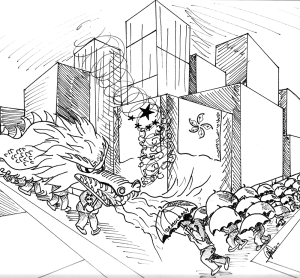
National Day is supposed to be a day of celebration for most Chinese. Yet, in the small city-state of Hong Kong, this Oct. 1 holiday was the beginning of a movement.
Self-government and self-determination have been rallying cries for the thousands of students who flooded the streets for the Occupy Central with Love and Peace movement, which began as a reaction to the Chinese government’s refusal to allow Hong Kong to have true democracy.
During its handover from the United Kingdom to the mainland in 1997, the agreement promised Hong Kong 50 years of exemption from the socialist system in its mini-constitution, the Hong Kong Basic Law, which encompassed its political, economic and social policies. The promise of universal suffrage was also included.
China put forward a framework on Aug. 31 that would require chief-executive candidates to achieve a 50 percent approval rating from a nominating committee in order to ensure that a “patriot” assumes office in 2017 and beyond. For most Hong Kong residents, their right to vote meant preserving their way of life and paving the way for effective governance to solve any of Hong Kong’s myriad social and economic issues.
Thousands surged into the streets to support the movement against this proposal. Student-run groups like Scholarism and the Hong Kong Federation of Students led the movement alongside leaders of Occupy Central, a movement that began in 2011 shortly after Occupy Wall Street. An estimated 200,000 people took to the streets, occupying key locations in Hong Kong. The protest gathering in Admiralty spread to Tsim Sha Tsui, Causeway Bay and even the working-class area of Mong Kok.
When I travelled home to participate in the protests last week, there was a part of me that wondered if I was coming back to say goodbye to the only place I call home. Instead, I found a city that was spluttering with new life. The people of Hong Kong have made an admirable stand. It was an inspirational sight — but there was something missing.
This scene was wholly unexpected given Hong Kong’s divided political scene. Occupy Central had previously alienated moderate citizens who considered civil disobedience too radical.
Several things have changed since then. The Aug. 31 proposal was extreme in its finality, angering students who decided to take to the streets of their own volition in a surge of idealism and desperation.
Being what my friend laughingly dubbed “newbie protesters,” who had just barely discovered their newfound civic awareness, they found no outlet for their hope except through this movement, which was deemed radical just weeks ago. Groups leaped in to guide the movement.
Scholarism, led by 17-year-old Joshua Wong, came to prominence for defying the central government.
But, mobilization was not a triumph in itself; we need politically savvy representatives who are willing to compromise and negotiate for the future of Hong Kong’s rule and autonomy, not hotheaded leaders who are advocating for a never-ending occupation outside government buildings. The Hong Kong government might be paralyzed, but Beijing is still unlikely to budge. Citizens are calling for the government to honor the latter part of “one country, two systems,” but Beijing will never let Hong Kong forget the former part either.
But, being in the thick of the movement gave me hope. There were idealistic thinkers and earnest students. Public lectures were being given by professors, civil servants and activists in public squares and amphitheaters, which had been renamed “the Democracy Square.” Students and workers alike held discussions about the common people’s demands as well as about how the movement could effect positive change through dialogue and negotiation.
I saw a strong thread of civic education alongside a grassroots-democracy movement; it seemed like the beginning of a robust civil society. So, why are their leaders acting like they have no sense of political strategy or knowledge of modern Chinese history?
Different groups have started jockeying for positions of leadership. Who will represent the students? Who will represent the people and the workers? What about the remaining 6 million people who have not taken to the streets to express their will?
In fact, the movement has been slowly losing the hearts of the people, who see the movement as a disruption and inconvenience in their daily lives. The common people and small businesses that were hurt by the continuous occupation had more faith in the stable and prosperous society they’d always known. If we want to see a true democracy, we need people to demand accountability, beginning with the leaders of this movement.
“Do you hear the people sing!” proclaimed a banner hanging from a bridge in the Occupy area. The answer is a resounding yes, but whether we will hear it at the negotiating table is another story.
Cheryl Lau is a junior in the School of Foreign Service.



















